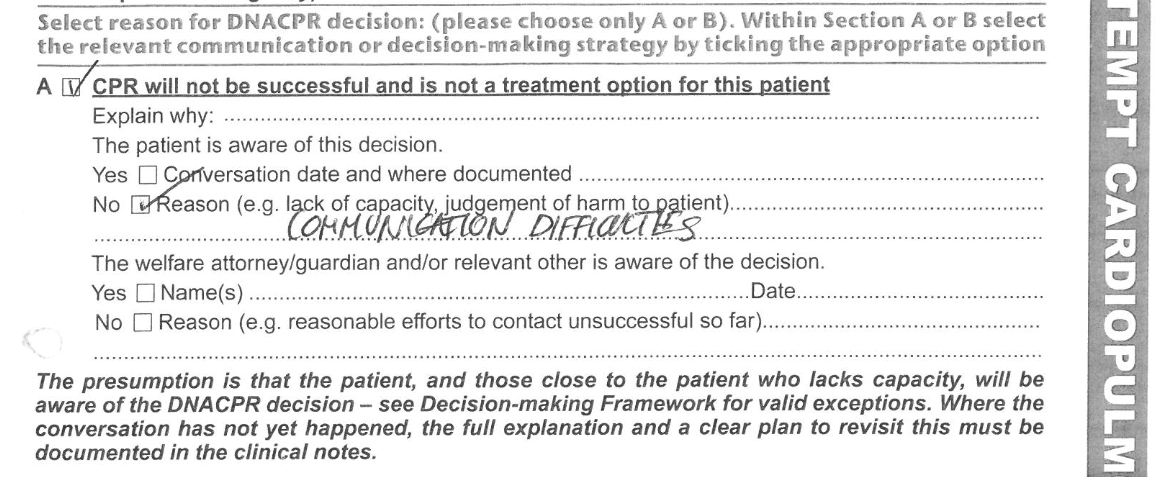Communication rights for deaf people
Doctors at NHS Scotland gave a deaf man a ‘Do Not Resuscitate’ order without his knowledge or consent.
The profoundly deaf man is a resident at Deaf Action’s supported accommodation for deaf adults in Slateford Green, Edinburgh. He is in his 60s, with a good quality of life. He had no knowledge of the decision that had been made for him.
At a recent routine hospital appointment, he was given the DNR order without any communication support to explain what it meant. The order states that ‘in the event of a cardiac or respiratory arrest no attempt to at cardiopulmonary resuscitation (CPR) are intended.’
When support staff at Deaf Action saw the DNR order, they were shocked to see that it had been marked up to state that the patient was not aware of the decision.
The reason given was ‘communication difficulties’.
Are deaf people not worth saving because of ‘communication difficulties’? This is not an acceptable reason to impose a DNR order on anyone. Deaf people face communication barriers every day, but their lives have just as much value as hearing people. It’s extremely concerning a deaf person was not deemed worthy of saving, due to communication issues.
Alison Richards, Support Manager at Slateford Green said:
“We were shocked when the gentleman came back from his appointment and handed us the letter. He had no idea what it was, so asked us about it. We can’t believe he was given a DNR order without consulting with him. Everybody has a right to make a decision about their health, and that includes deaf people.”
Access to interpreters
BSL users have the same right to access information as everyone else. Without interpreters or communication support, deaf people are being left out of the conversation about their own lives.
The NHS did not offer a BSL/English interpreter or any communication support to aid this conversation. British Sign Language (BSL) is a legally recognised language in Scotland, and BSL users have the right to represent themselves and access information from both deaf and hearing people.
It is essential that deaf people are given access to interpreters and communication support, especially within hospitals and medical settings. They have a right to know what is being discussed, and a right to make decisions about their themselves.
The team at Deaf Action discussed the DNR order with the man, and swiftly arranged an appointment with his GP. A BSL/English interpreter was arranged for the appointment, so that the GP could discuss the DNR with the man.
Gordon Hay, Head of Operations at Deaf Action said:
“It’s a shocking failure that ‘communication difficulties’ were cited on this DNR order. British Sign Language was formally recognised in Scotland in 2015, so deaf people have a legal right to access information in BSL. Provision for language interpreters is absolutely vital – they provide smooth communication between health professionals and BSL users, and that communication can stop problems like this from happening in the first place.
It doesn’t matter what language we use – ‘communication difficulties’ should not be a reason to potentially end a person’s life.”
It was reported earlier this year that people’s human rights had been breached during the pandemic, with healthcare professionals choosing DNRs for patients without consulting the person, or a family member when they are unable to make that decision themselves.
Need an interpreter?
Deaf Action has an experienced team of registered interpreters. All are skilled in providing communication support in a variety of settings, including for health appointments, such as GPs, dentists and hospitals.
An interpreter is not permitted to offer any form of advice or opinions, only to directly interpret. At Deaf Action, our interpreters adhere to a strict code of practice to ensure a confidential and impartial service.
Find out more about our interpreting service here.

